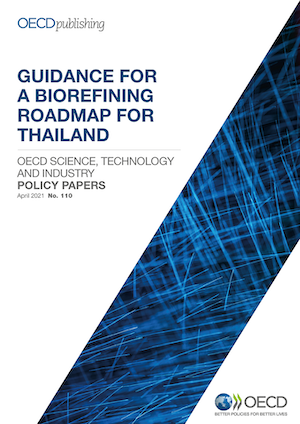Biorefineries present an alternative to fossil-based production, and can create employment, wealth and the ecosystem needed to make them function. Thailand is establishing a bioeconomy with widespread biorefining as a strategy for future economic growth. There is political will to establish in Thailand, if feasible, small, decentralised biorefineries to which farmers can locally deliver biomass as feedstock, which can then be processed into bio-based products. This would help to relieve rural poverty, which is still a problem in some areas of Thailand despite progress. Developing a biorefining roadmap will help to assess the feasibility of such an initiative.

For Thailand, it has become key political objectives to overcome the middle-income trap and decrease inequality. Thailand’s success over the last few decades means that labour costs are now higher than competing developing countries, but its level of innovation and technology cannot compete with highly industrialised and innovative countries. Therefore, it is logical to focus on an area such as the bioeconomy, which is high in potential of innovation and technological progress. Several strategic policy documents bear on the Thai bioeconomy, including the National Biotechnology Framework, the Bioplastic Roadmap and the Alternative Energy Development Plan, which are from 2004, 2005 and 2012 respectively. Also, the “Thailand 4.0” initiative from 2015 included bioeconomy as a future growth industry and most recently, in 2016, the BCG model (Bio, Circular, Green) was agreed on as a strategy to overcome the middle-income trap.
Biorefineries represent the embodiment of a new production paradigm for the bioeconomy. It is in these biorefineries that feedstock is processed into higher value products. The biorefineries themselves create employment and wealth, but they also create the ecosystem needed to make them function. In these new value chains, policy makers must seek to support the entire chain, especially if the products are to compete in markets already established through using fossil-derived feedstocks. There is political will to establish in Thailand, if feasible, small, decentralised biorefineries to which farmers can locally deliver biomass as feedstock, which can then be processed into bio-based products.
This report examines what would be necessary for Thailand to make a biorefinery roadmap. A roadmap can take many forms and can be of any size. What should be critical to a roadmap is a timeframe to show potential investors the commitment from government to achieve the goals set out. To transform a roadmap from an aspiration requires some mechanism to make sure that the milestones and deadlines of the roadmap are achieved.
It has also identified strengths and weaknesses at a macro-level. There are clearly infrastructure and market strengths in Thailand, with a successful petrochemicals industry and well-developed demand markets for pharmaceuticals, food supplements / nutraceuticals and protein feed. Nevertheless, under the same category, several companies remarked on the strong dependence of imports of technology and machines from foreign countries, and immigration policies do not favour attracting foreign expertise.
If you want to know more about biorefineries and the emerging bioeconomy in Thailand, you can download the full report for free here: www.renewable-carbon.eu/publications/product/guidance-for-a-biorefining-roadmap-for-thailand/
For more information please contact Lara Dammer, Head of the department Policy & Economy.
Source
Supplier
nova-Institut GmbH
Organisation for Economic Cooperation and Development (OECD)
Share
Renewable Carbon News – Daily Newsletter
Subscribe to our daily email newsletter – the world's leading newsletter on renewable materials and chemicals












